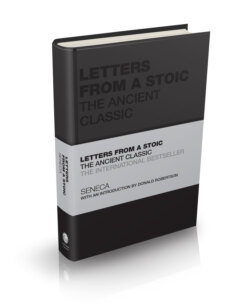Читать книгу Letters from a Stoic - Donald Robertson - Страница 13
EXILE
ОглавлениеAfter being acclaimed emperor, Claudius permitted Julia and Agrippina to return from exile to Rome. But before a year had passed, Julia was in trouble again. Claudius' wife, the Empress Messalina, accused Julia and Seneca of committing adultery with one another. They were both found guilty. Julia was exiled first, probably to a nearby island off the Italian coast, where Claudius shortly after ordered her death. Seneca, on the other hand, wasn't banished from Rome until the following year, which suggests there may have been more wrangling over his sentence. Messalina wanted the death penalty but Claudius, after some delay, sentenced Seneca to be exiled to Corsica instead. Technically he was ‘relegated’, the mildest form of exile, which meant he avoided losing any property or being stripped of his citizenship. You could, therefore, call this an act of clemency on the emperor's part as Seneca got off much more lightly than Julia.
Around 42 CE, shortly after he arrived in Corsica, Seneca wrote another open letter of consolation. This one was to his own mother, Helvia, whom he sought to console not over a bereavement, as would be the norm for the genre, but over the grief caused to her by his own exile. In it, as noted earlier, Seneca portrays himself Stoically enduring a harsh and barren environment:
What can be found barer or more precipitous on every side than this rock? What more barren in respect of food? What more uncouth in its inhabitants? More mountainous in its configuration? Or more rigorous in its climate? (Helvia, 6)
In 44 CE, Seneca published another open letter of consolation. His fame as a writer seemed to be growing thanks to the popularity of these letters. This one was addressed to a freedman called Polybius who served as secretary to Claudius, and had considerable influence at court. Seneca urges Polybius, who had recently lost his brother, to console himself by focusing on the happiness that serving Claudius bestowed upon him. He says things like ‘raise yourself up, and fix your eyes upon Caesar whenever tears rise to them; they will become dry on beholding that greatest and most brilliant light’. He tells Polybius to write a panegyric praising Claudius' reign, which might be read ‘by all future ages’, adding ‘for he himself will afford you both the noblest subject and the noblest example for putting together and composing a history’.
The letter eventually turns from being a consolation of Polybius into a plea for mercy directed to his master, the emperor. While taking the opportunity to beg, via Polybius, for an imperial pardon, Seneca also heaps praise on Claudius for his clemency and other virtues. As we'll see, this could not be further removed from the way Seneca later chose to portray Claudius in writing. Seneca concludes by bemoaning the fact that his ‘mind is dimmed and stupefied’ by the tedium of his long exile. He writes of the difficulty in consoling another while he is steeped in his own sorrows. He complains that his Latin has suffered because around him, on Corsica, he ‘hears nothing but a rude foreign jargon, which even barbarians of the more civilised sort regard with disgust’. Once again, his real circumstances appear to have been far more comfortable than he implies.
